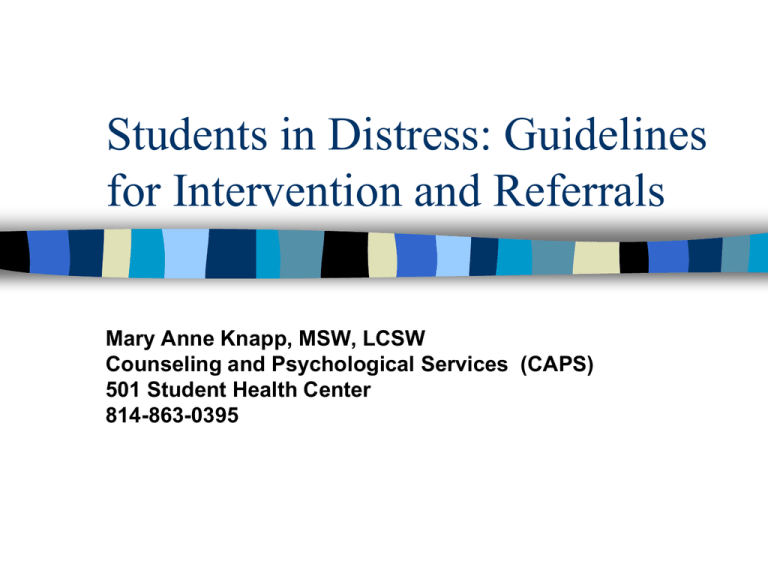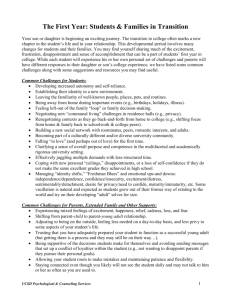
Students in Distress: Guidelines
for Intervention and Referrals
Mary Anne Knapp, MSW, LCSW
Counseling and Psychological Services (CAPS)
501 Student Health Center
814-863-0395
Students in Distress: Guidelines
for Faculty & Staff Interventions
The Importance of Your Role w/ Students
College Student Issues/Distress
The Center for Counseling and Psych
Services (CAPS)
Tips for Recognition
Guidelines for Intervention/Referral
Dealing with Specific Situations
Evaluation and Ending
Young Adult/College Context
Pressures for Academic Performance
Overwhelming Life Changes
Financial Issues
Limited Social Support Network
Losses/Traumas
Identity Issues
Lifestyle/Body Abuse
Limits of Current Coping Skills/Strategies
Development of Disorders in Adulthood
Penn State Counseling Contacts
at University Park CAPS
2500 + students per year for clinical
assessment and treatment
Up to 16,000 clinical contacts per
year
5000 outreach contacts with students
including programs & postventions
following crises/deaths on campus
Center for Counseling and
Psychological Services (CAPS)
Office: 501 Student Health Center
Hours: Mon-Fri 8 am.-5pm.
Phone: 863-0395
Center for Counseling and
Psychological Services (CAPS)
Initial Interview-Appt. and Crisis
Individual Short Term Counseling
Couples Short Term Counseling
Group Therapy- 25 groups/semester
Psychiatric Services (Medication Evals)
Outreach Services-Workshops
Consultation
Referrals
CAPS GROUPS
General Interpersonal Therapy Groups
Women’s and Men’s Therapy
Depression Group
Stress Management Group
Anxiety Group
ADHD Support group
Recovery Groups
Discussion/Support Groups
Recovery Groups
Substance Abuse
Eating Disorders
Sexual Assault
Grief and Loss
Discussion/Support Groups
LGBT Graduate Therapy Group
Students of Color Support Group
International Student Group
Blended Heritage Discussion Group
Dialogues About Race Groups
Center for Counseling and
Psychological Services (CAPS)
Initial Interview- Appts. & Crisis
Individual Short-term Counseling
Group Therapy
Psychiatric Services
Outreach Services-Workshops
Consultation
Referrals - Campus and Private
CRISIS RESOURCES
CENTER FOR COUNSELING AND
PSYCHOLOGICAL SERVICES (CAPS)
Mon- Fri 8 am - 5 pm
CENTRE COUNTY CAN HELP LINE 24 hr.
1-800-643-5432
911- For emergency
Police/Ambulance
863-1111 Police Services on Campus
863-0342 Judicial Affairs
TIPS for Recognizing
Distressed Students
Use your senses to pick up
observable cues.
Areas of Observation
Difficulty with Academic &/or Social
Functioning
Unusual Behaviors and Appearance
References to Stressful Life Events
References to Suicide, Homicide or
Death
Difficulties with
Academic & Social Functioning
Absences
Withdrawal
Excessive anxiety re performance
Disruptive behavior
Unusual Behavior or Appearance
Depressed mood or functioning
Hyperactivity or pressured speech
Deterioration in hygiene or self care
Dramatic weight loss or gain
Strange or bizarre behavior/Loss of
contact with reality
Problems with boundaries
&expectations
Observable Signs of injury
References to
Stressful Life Events
Experiencing death of a significant
other
Experiencing a sexual or physical
assault
Experiencing
discrimination/alienation
Experiencing legal difficulties
Any problem or situation viewed as a
loss
References to
Suicide, Homicide or Death
Overwhelming hopelessness &
helplessness
References to suicide or self harm
References to homicide or assaultive
behaviors
Isolation/withdrawal
General Intervention Guidelines
Basic Helping Skills
Structuring the Contact
Passive Listening and Attending
Active Listening-Reflections and
Clarifying Questions
Expressions of Support, Feedback
and Validation- “I” messages,
Sharing Information
Defining Limits and Making Referrals
General Intervention Guidelines
Arrange for a private place and a
time when you won’t be interrupted
If you initiate the contact, express
concerns in a behavioral and nonjudgmental way.
Let the student talk.
Listen for both content and feelings.
Intervention (continued)
Give Realistic Hope. Help student
know their options and resources
and assure them that things can get
better.
Avoid a judging, distant or critical
style
Maintain clear and consistent
boundaries and expectations
Suggest and Normalize referral
Intervention (continued)
Be sensitive to timing-Is this a
crisis?
Escalate and Facilitate as needed
Prepare the student for what to
expect
Arrange a time to follow-up
Consult when in doubt about an
intervention
Dealing with Specific Situations
Suicide
If someone alludes to suicide or you aren’t
sure, It’s important to follow-up and ask.
“Has this reached a point where you feel
so badly you have thought of suicide?”
If suicidal, Refer for Help and Escalate as
needed: Voluntary through CAPS or CAN
HELP (24 hr crisis) or Involuntary through
Judicial Affairs or Police Services.
Danger to Others
If someone is making vague threats,
it’s important to follow up and ask if
they are serious.
Refer and Escalate as needed.
Voluntary intervention through
Police intervention depending on the
extent and immediacy
CRISIS RESOURCES
CENTER FOR COUNSELING AND
PSYCHOLOGICAL SERVICES
(CAPS) Mon- Fri 8 am - 5 pm
CENTRE COUNTY CAN HELP LINE
24 hr. 1-800-643-5432
911- Emer.-Police/Ambulance
Judicial Affairs 863-0342
863-1111 Police Services on Campus
The End
View Students in Distress
workshop on the web:
http://www.sa.psu.edu/caps/distress/

